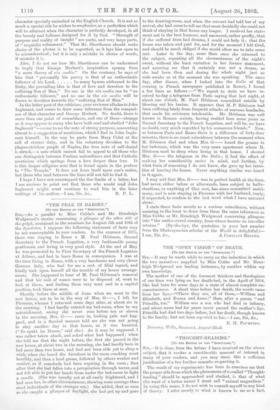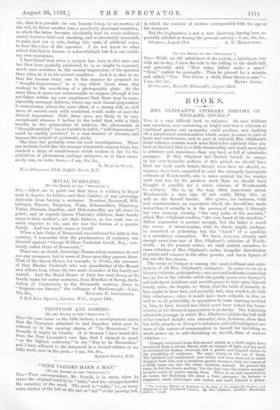"THOUGHT-READING."
[To THE EDITOR or THE " SPEOTATOR."] SiR,—It is clear, from the letters I have received on the above subject, that it excites a considerable amount of interest in many of your readers, and you may deem this a sufficient justification of a few further remarks respecting it.
The result of my experiments has been to convince me that the proper side from which the phenomena of so-called "Thought- ieading " should be approached and studied, is that of what (for want of a better name) I must call "animal magnetism." In using this name, I do not wish to commit myself to any kind of theory. I refer merely to what is known to me as a fact, viz., that it is possible for one human being, by art exertion of the will, to throw another into a peculiarly abnormal condition, in which the latter becomes absolutely deaf to every ordinary sound, however loud and startling, and as absolutely insensible to pain, and yet is able, during this state of artificial coma, to hear the voice of the operator. I do not know to what extent this fact is known or acknowledged, but it is one within my own experience.
I have found that v;rheu a subject has been in this state and has then been partially awakened, be is, as might be expected, much more sensitive to the mental impressions of the operator than when he is in his normal condition. And it is clear to mc that the human brain can in this manner be prepared for "thought-impressions," in a way which bears some dim analogy to the sensitising of a photographic plate. At the same time, it seems not unreasonable to suppose (though it has not fallen within my own experience) that there may he cases, especially amongst children, where any such formal preparation is unnecessary, where the mere effort of a strong will, or, still more, of several such wills combined, would make at once the desired impression. Still, these cases are likely to be very exceptional, whereas I incline to the belief that, with a little trouble in the preparation of subjects, the phenomena of " thought-reading " (or, as I prefer to call it, "will-impressions") could be readily produced in a vast number of persons, and become the subject of systematic study.
The time has probably come for such investigations. There can belittle doubt that the average nineteenth-century brain has reached a stage of sensitiveness which renders it ripe for the exhibition of phenomena perhaps unknown, or at least exces- sively rare, in ruder times.—I am, Sir, &c.,































 Previous page
Previous page